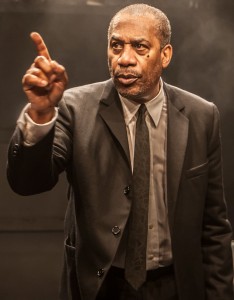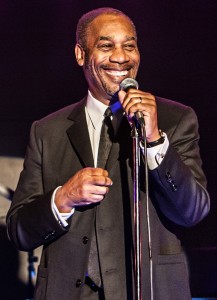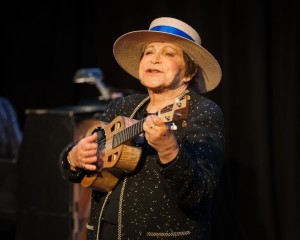Shortly after launching into his solo show Sugar Daddy, Sam Morrison talks about being mugged. The thief, armed with a gun, demanded his cell phone, and Morrison resisted because it had pictures of his late lover Jonathan on it. “I know we just met,” Morrison tells his audience, “but I think we can all agree that was off-brand.” (It’s clear from the audience’s ebullience that they know perfectly well what his brand is. The mostly young crowd in fleeces and pullovers and trainers have been boisterously waiting for him, even drowning out the pre-show music.) “I’m an anxious, asthmatic, gay, diabetic Jew,” explains the comedian. “We’re not known to excel in moments of crisis.”
Hot Mess
A retitled version of Regretrosexual—The Love Story, a play written roughly 10 years ago by Dan Rothenberg and Colleen Crabtree, the “new play” Hot Mess is about the authors’ unusual courtship and marriage. Both were comedians working in Los Angeles, and the work focuses on a particular hurdle Rothenberg had to overcome: he had lived as a gay man for two years in San Francisco before meeting and marrying Crabtree. Scrubbing out the “regret” part of the former title and using the catchier Hot Mess eliminates the implication of previous disappointment in the age of political correctness.
The Tongue Is a Mighty Sword
Move over, James Brown. It’s time to add Joe Morton and Dick Gregory's names to the pantheon of hardest-working men in show business. In Turn Me Loose, written by Gretchen Law and directed by John Gould Rubin, Morton gives a tour de force performance as Gregory, the tireless civil rights activist and stand up comic known for his acerbic social satire on race and American politics.
Morton, of the hit TV show Scandal, adeptly captures both the younger and the older Gregory as the play moves back and forth in time. As a comedian, Gregory eloquently holds a mirror up to the contradictions in American society. Although he believes economics are at the root of many problems in society, he contends that “poverty is not the worst disease on earth. Racism is.”
Born in 1932, in St. Louis, Gregory says he had “black assets: fast feet, and a fast tongue.” He was athletic and outspoken, and when he was given a three-year contract at Hugh Hefner’s Playboy Club in Chicago in 1961, he was catapulted into another realm as an entertainer, not as a “shuffling minstrel, but as a 28-year-old star.” However, he often stepped down from comedy to take up the cause of the 1960s civil rights movement and march side by side with Medgar Evers.
Morton captures the conflict between being a performer and being an activist that caused Gregory to take pause at moments in his life. In a chilling moment, the young activist gets a bad feeling that he can’t shake before heading back down South to join Evers. But suddenly his son dies and he returns North to join his wife. Only two weeks later, Evers is assassinated; Gregory believes his personal tragedy spared his life. The dangers of activism and being a black man in the South in the ’60s were never more apparent. He realizes that the "racist system is nothing but a shadow. You got to dive through—every day could be your last.” He also realizes that bigotry is like the barb of an arrow piercing the skin. Gregory returns to comedy and aims, not so much to extract the arrowhead from the sides of American racists, but to shake them with enough laughter that it will fall out.
Morton’s voice has a deep timbre, and he has amazing reserve and control over both his voice and physicality. Often, while the tempo and volume rise, his body is restrained and still. Near the finale, sweat pours down his face, and instead of taking the handkerchief, as he does at times throughout the play, he forges through what he has to say: the power of his words is amplified by the apoplectic state of his face.
The raw immediacy of Morton’s performance, coupled with the power of Gregory’s message, incites some members of the audience to murmur “Mmm-hmmm” and “Yeah,” as if they are receiving a message from the pulpit rather than the stage. Also helping tell the story in a variety of roles is John Carlin; among other things he plays a bumbling mediator at a loss for words when Gregory delivers an acerbic diagnosis of the state of economics and its effect on all that ails American society.
It takes tremendous courage and intelligence to design and deliver the kind of comedy Gregory does. At 83, he's still going strong. Because of his work with the civil rights movement, and the way in which he has relentlessly, with humor, grace and a tongue like a sword, dissected the contradictions about race in America, the conversation itself has since taken a few twists and turns. For instance, Vin Diesel, who rose to stardom in The Fast and Furious films, declines to accept any racial pigeonhole. Rather, says one observer, Diesel presents himself as “a multiethnic Everyman.” The actor’s insistence on identifying himself as a human being, rather than by race, is an important step. As Turn Me Loose makes plain, it’s one that Dick Gregory has worked tirelessly for.
Turn Me Loose plays at the Westside Theatre (407 West 43rd St.) through July 3. Evening performances are at 7 p.m. Tuesday, at 7:30 p.m. Wednesday and Thursday, and at 8 p.m. Friday and Saturday; matinees are at 2 p.m. Saturday and at 3 p.m. Sunday. Tickets are $79 and may be purchased by calling (212) 239-6200 or visiting www.turnmelooseplay.com.
81 and Still a Bawdy Broad
As the lights illuminate the scant set design on stage—a keyboard, table, chair, a white and gold embellished frock on the wall and ukulele—a man appears and begins to play an overture of music on the keyboard while a petite, 81-year-old woman arrives in a gold sequined beret adorned with an Eiffel tower sewed on top. This cabaret duo of singer D’yan Forest and her longtime friend and pianist Richard Danley then begin the one-woman cabaret stand-up comedy show, A Broad Abroad!
Forest’s show is a compilation of her personal memoirs. She jokes that she tells her age at the beginning of the show “just in case I don’t make it to the end.” She is not the typical, cookie-baking, grandmother figure. Instead, she recounts her travel experiences across the globe and “studies in men, life and pantomime.” Forest tells you every dirty detail down to cunnilingus and warbling about dying her hair and her lady bush that reflects her “I ain’t 20 either and I don’t care neither. And I dye my hair not just here, but there," mentality. As for her thoughts on the horizontal mambo, she says, “Most of my friends have given up on sex. Not me, my rule is it ain’t over until the fat lady is dead.”
The solo entertainer is energetic in her delivery on stage. She strums the ukulele quite impressively as she sings in French, German and Italian. She shows off her still nimble body when laying down on stage and getting up with ease while telling the story of her escapades in a Turkish bath. When she sings the song, "La Vie en Rose," her eyes twinkle with emotion and vigor.
Forest is a skilled artist who delightfully played musical renditions of nostalgic classics. However, some of the jokes that she and her co-writer, Eric Kornfeld, have written as transitions are predictable and stale. These include references to the old joke (“My parents went to China, and all I got was this lousy t-shirt.") and the inevitable math problem that happens when an older person hooks up with a younger person (“One thing I know for sure 25 goes into 76 many more times than 76 goes into 25.”).
The out-of-date script shows Forest's lack of a fresh perspective on the common-life experiences of women. Instead, she teaches you the age-old lesson, “Nobody told you life would be easy but it doesn’t mean you can’t have fun.” In topics of divorce and her perceived inability to make her mother happy, Forest appears heartfelt and authentic. Despite this, the audience's biggest takeaway is that she runs off and avoids the problems at hand. She would much rather be having sex and learning a new language than diving into life lessons.
Clearly, Forest doesn't seem to care whether or not the audience is laughing with her or at her. Her pure love of cabaret is illustrated in her command of the stage. Although she has lived her life with gusto, perhaps it’s time for some deep philosophical reflection?
A Broad Abroad! is running in the 10th annual FRIGID Festival at The Kraine Theater (85 East 4th St. between 2nd Ave. and Bowery) in Manhattan. Remaining dates and times: Wednesday, March 2 at 5:30 p.m. and Friday, March 4 at 8:30 p.m. Tickets are $15 for adults and $10 for students, seniors and the military. Visit www.horsetrade.info to purchase tickets.











